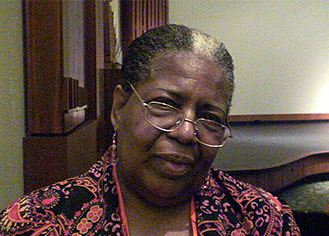Detroit's youth: We'll leave if we have to
If young Detroiters can't find jobs, an exodus could be in the works. But a few say they'll stay and deal with what comes.
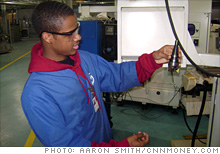 |
| Isaiah Brooks: "You got to go where the money is." |
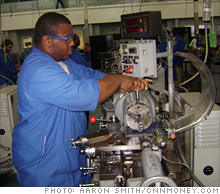 |
| Kenneth Rupert: "It's looking like most of the jobs are down south." |
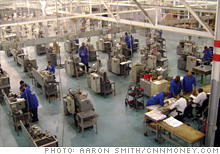 |
| The Focus: HOPE school in Detroit once trained machinists for carmakers, but it is branching into different markets as the industry declines. |
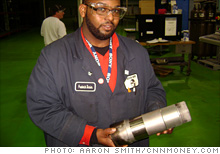 |
| Frederick Dunbar: "I'm compelled to go wherever my job takes me." |
DETROIT (CNNMoney.com) -- Isaiah Brooks expects to graduate soon from Focus: HOPE, a non-profit machinist school in Detroit, where his hopes of getting a job are fading along with the local auto industry.
Machinists are the backbone of automaking, but Brooks might have to leave town to find a job, like many other young people in this city.
"You got to go where the money is," he said during a question and answer session with his classmates at Focus: HOPE. Brooks, 19, is thinking of moving back to his native state of Texas to work as an auto mechanic with his father.
"You can't sit around and wait for an opportunity to happen," he noted. The other students in his class nodded in agreement.
Kenneth Rupert, 19, another machinist-in-training at Focus: HOPE and a former intern for Ford Motor Co., (F, Fortune 500) said he would stay in Detroit if he could find a good job, following in the footsteps of his late grandfather and his uncle, who once worked for the auto industry.
But Rupert said he is feeling the pull of other regions, with stronger job markets. "It's looking like most of the jobs are down South, and most of my family is from South Carolina," he said.
Focus: HOPE was founded in 1981 to provide free training and education to aspiring machinists and engineers, and to feed the workforce of the auto industry, which no longer seems to want them.
"We're finding that the jobs in the auto industry are not there," said Beverly Triplett, job placement supervisor for Focus: Hope. Job placement for program graduates fell to 64% last year, from 85% in 2007, she said. "It's challenging, because you have to make something out of nothing."
Detroit's biggest private employer, General Motors (GM, Fortune 500), plans to reduce its worldwide work force by 37,000 hourly workers and 10,000 salaried workers by the end of the year. The company wouldn't say how many reductions are slated for Motor City, but the impact is inevitable. GM employs some 36,700 workers in Southeast Michigan, out of a worldwide workforce of 243,000.
That's pretty bad news for an already-depressed job market. As of August the unemployment rate in Detroit proper was almost 30%, according to the most recent figures from the Bureau of Labor Statistics.
Triplett said that Focus: HOPE and its students, including teenagers training for their first jobs and laid-off line workers looking for a career change, are retooling their training to other fields that need machinists and engineers.
Triplett is trying to place three of the school's students at Glass & Mirror Craft in Wixom, which makes products used in architecture and interior design, and is some 40 miles away from Detroit.
Other new fields include refurbishing parts for military equipment and precision manufacturing for the medical industry.
Frederick Dunbar, a married 23-year-old with two children, used to make parts for the auto industry at Mac-Mold Base, Inc. in nearby Romeo. When his 12-hour days dwindled to six hours, he decided to pursue an associate's degree in manufacturing engineering technology at Focus: HOPE. Now, he's learning how to use laser technology to refurbish submarine parts for the Navy. He said he has no intention of returning to the auto industry, and would leave Detroit if a good job beckoned.
"I'm looking at NASA, the Department of Defense, maybe civil engineering," said Dunbar. "Definitely, I feel more secure pursuing a government job. I'm compelled to go wherever my job takes me."
Residents' willingness to just pick up and go doesn't bode well for Detroit's economy. But it doesn't have to be that way, according to Alan Clark, 24, who's studying engineering manufacturing at Focus: HOPE. Clark just accepted an engineering job in Detroit at the Pepsi Bottling Group.
"Just because I live in Detroit, I don't have to go to the automotive industry," he said. "The same concepts you use to make a car, believe or not, are the same concepts and principles you use to make a bottle of Pepsi."
College and high school students interviewed by CNNMoney.com offered a wide variety of responses as to whether they would stay in Michigan, with its 15.2% statewide unemployment rate, the highest in the nation.
Alexandra Ritson of Grand Rapids, a 21-year-old senior in the English and Spanish programs at the University of Michigan in Ann Arbor, said she had accepted a teaching job in Arizona. Considering the Detroit Public Schools' plan to lay off 600 teachers due to its deficit and declining student population, she didn't see much point in getting certified in her home state. "It's one of the hardest states to get a teaching job in the country," she said.
Others see opportunities at home. Samantha Staley, a 22-year-old from Flushing is a senior at Detroit-based Wayne State University, where she's studying pre-medicine and mechanical engineering. Staley said there are plenty of local jobs for doctors, and she has no intention of leaving.
"I'm an optimist," she said. "I see things hopefully turning around. Detroit has a bad rap. But living down here, I actually love Detroit. There's a pride among the people who live here. The feeling is that we know what it's like to struggle, but we can overcome."
Despite Detroit's bad rap, aspiring architect Dyamond Logan, 15, also wants to stay. Through her involvement with the Better Detroit Youth Movement, a non-profit mentoring organization for young people, Logan said she can learn a lesson from a community that has seen better times.
"Challenge and turmoil are a necessity for growth," she said.
The Better Detroit Youth Movement generally meets in a hair salon owned by co-founder Harlan Bivens, but it had to move to a temporary location in a restaurant after the business was burglarized, its front window smashed in and boarded up, but that failed to stop him.
"We have to be the lions in the jungle, versus lions in the cave," said Bivens, who believes it doesn't matter where his work is done, so long as it's out in the community.
Dyamond Logan understands that she may need to leave that community to begin a career as an architect somewhere else, but she intends to return one day.
"In Detroit, I would like to pursue my dreams," she said. "Detroit, as a whole, is our foundation, and you have to help with your foundation." ![]()

